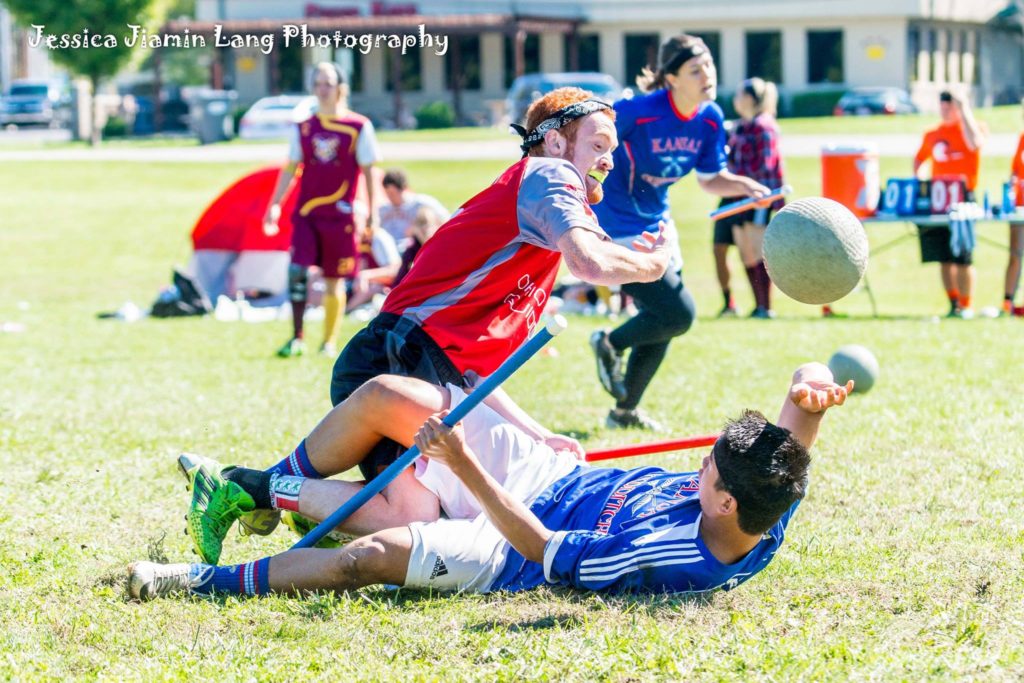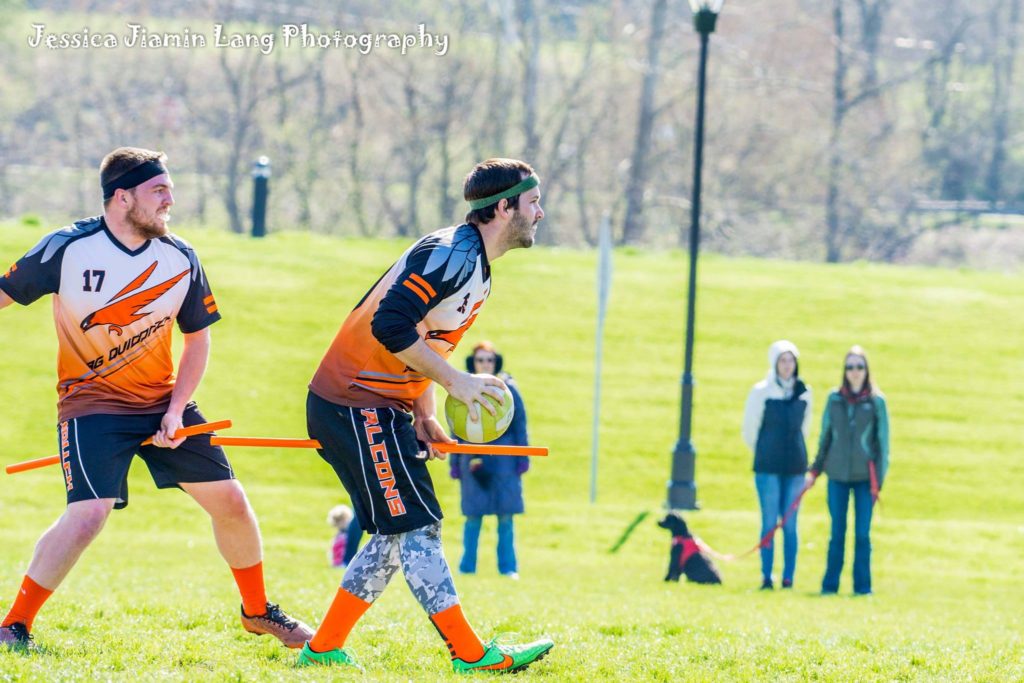Antwerp QC, Much of Belgian Core, Leaves Competitive Quidditch

Credit: Jessica Jiamin Lang
By Tyler Walker
Managerial Editor
David Hoops
Great Lakes Correspondent
On the eve of the Great Lakes Regional Championship, our correspondents took a look at where the region stands. From potential MVPs and breakout players to mayhem in pool one and Dansanity, here’s what to watch (or not) this weekend.
![]()
MVP: Max McAdoo or Jason Bowling
If Bowling Green State University, the hottest team this fall, ends up hoisting a regional trophy, it will be on the back of Max McAdoo. The squad will rely on him to clear lanes on offense, make phenomenal catches to earn control back and, possibly, catch a few snitches when seeker Sam Roitblat needs a breather. If Ball State University comes out on top, there is little doubt that it will have come down to Team USA’s Jason Bowling giving the Cardinals a few wins in even, low-scoring contests.
Rookie of the Year: Nathan Ellert
With the loss of Blake Fitzgerald, the 2016 MVP of the MLQ North Division, Ball State was in need of a keeper to complement Nick Kaufman. At 6 foot 6 inches, rookie Nathan Ellert has performed at a high level thus far this season, filling the hole perfectly. He also serves as a back-up seeker for the Cardinals. Ellert fits in well to the Ball State offense that likes to pass. He is able to create opportunities for teammates as well as be a create extreme mismatches around the hoops.
Eighth Man: David Prueter
The return of David Prueter, David Wilber and Ashley Calhoun to Central Michigan University turned the squad from a bubble team to an almost-guaranteed qualifier. Why almost? Well, a tough pool draw with Lake Erie Elite and Miami University could make things more interesting than the Central Michigan squad would prefer. Prueter still has all the talent he had a few years ago when the team cracked The Eighth Man Top 20—he would easily start for most teams in the Great Lakes. His play allows Taylor Felton rest in big games or gives the Centaurs the option to put Felton at chaser, causing matchup problems for any opposition.
Most Improved: Travis Hammock
Travis Hammock is in his senior year at Ohio State’s, having fluttered between the university’s varsity and JV squads multiple times. Graduation gave Hammock a chance to move into a prominent role last season, but he was overshadowed when Jeremy Boettner switched to beater, showing his athletic gifts weren’t limited to scoring goals. With Boettner likely to spend more time in the quaffle game once again—where he remains, arguably, the best in the region—Hammock’s growth as an undersized, speedy beater brings a balance which Ohio State has been seeking.
Defensive Player: Matt Oppenlander
After leading University of Michigan last season to a dominant regional title, Matt Oppenlander has moved on to being the focal point of a physical Lake Erie squad. Even with defensive stalwarts Dylan Schepers, Chris Barnard, Krystina Packard and Jacob Heppe, Oppenlander figures to be the best point defender on what will undoubtedly be a defensively-minded team. Excellent tackling form, a quick lateral burst and fearless mindset checks all the boxes to create a feared point defender, and Oppenlander will make offenses deal with him first if they want to score.
Coach: Matt Pesch
There are very few actual coaches in the sport of quidditch but Matt Pesch has taken the mantle for Indiana and ran with it. The most impressive part is how he handles himself. Pesch is a player who can and has played at a high level at all four positions. At the 2016 MLQ Championship, Pesch played chaser, beater and seeker. He is able to compete with anyone in the region at any position he chooses, and Pesch has been making that decision while playing significant minutes. Last year, Indiana came up a snitch catch short of making the big dance on Pesch playing nearly every position in their surprising consolation run. It will be his ability to manage his teammates and himself that will push Indiana back to the national championship.
![]()
Pool One Mayhem
The first pool of the Great Lakes Regional Championship brings a weaker Pot-One team in Central Michigan; a Miami University team that you can always count on to be a tough defeat; and a total wildcard in Lake Erie. Lake Erie and Central Michigan have already played to a draw in quaffle points once this season, and there is little reason for that to change. Central Michigan has the edge in the beating game with Calhoun and Jack Slater, while Elite counters with the most physical chasing line in the region. Miami’s results this season, featuring an overtime loss to Ball State and quality wins out of range over Illinois State University and Marquette University, figure to reason that all three teams are close to the same tier. A three-way tie at the top, separated by point differential, is far from unlikely.
Michigan is going to qualify… Right?
The team hit hardest by the college regulations this season, Michigan, has proven they can still win games against top teams. They have also shown serious vulnerability to strong beating. University of Missouri was able to keep the Michigan offense from crossing mid-pitch for nearly half the game at Ball Brothers enroute to a blowout. This is a team who has never had to rely on beating because of their overwhelming dominance in the quaffle position for so many years. While they still have a solid quaffle line, it is not one that is able to dominate the pitch like in years past. This season, they have been forced to rely more on the beating game and the transition has not been seamless. Evan Hoopingarner or Erik Soreide are going to be the key to Michigan’s success. The second-year Hoopingarner and half year-removed Soreide will need to pick up the beating to lock Michigan in for a regional championship. Hoopingarner, who spent the summer playing MLQ for the Detroit Innovators has the athletic ability to compete against any beater in the region. It is a tall task for such a young player, but if he manages to harness that ability, Michigan will thrive. If the Wolverines are not able to find a beating game, they will be in trouble against the experienced beating corps of their day-one opposition, Ohio State and Grand Valley State University.

Credit: Jessica Jiamin Lang
The Return of Dansanity
Dan Daugherty has been one of the biggest names in the Great Lakes for over five seasons now. As a graduate student at Bowling Green, Daugherty has switched back to keeper after a season wearing black. The story on Daugherty in the quaffle game has always been to keep him away from no-bludger situations and bait him into the ridiculous long shots he was all too willing to take. Reason? If he got going downhill, it more often than not ended with a dunk after juking around two or three defenders. The last time he was in the quaffle game, the sport had yet to see the very patient, probing offense led by beaters clearing driving lanes. As a result, Daugherty’s effectiveness as a hero-ball scorer diminished as defenses grew more organized across the entire sport. But, on this roster, with the region’s deepest beating corps, best individual beater in McAdoo and physical point defenders like Josh Scott and Zach Conkle, Daugherty will be shielded from having to exert much effort defensively. A Bowling Green regional title, if they succeed, will look like this: McAdoo and co. hoard bludgers defensively; Daugherty scores six or seven times waltzing through the lanes they clear; and Roitblat comes through once again to seal the deal with a quick snitch catch.
Correction: This article previously listed the Rookie of the Year as Nathan Senger. The correct name is Nathan Ellert.
Archives by Month:
- April 2025
- May 2023
- April 2023
- April 2022
- January 2021
- October 2020
- September 2020
- July 2020
- May 2020
- April 2020
- March 2020
- February 2020
- January 2020
- December 2019
- November 2019
- October 2019
- August 2019
- April 2019
- March 2019
- February 2019
- January 2019
- November 2018
- October 2018
- September 2018
- August 2018
- July 2018
- June 2018
- April 2018
- March 2018
- February 2018
- January 2018
- November 2017
- October 2017
- July 2017
- June 2017
- May 2017
- April 2017
- March 2017
- February 2017
- January 2017
- December 2016
- November 2016
- October 2016
- September 2016
- August 2016
- July 2016
- June 2016
- May 2016
- April 2016
- March 2016
- February 2016
- January 2016
- December 2015
- November 2015
- October 2015
- September 2015
- August 2015
- July 2015
- June 2015
- May 2015
- April 2015
- March 2015
- February 2015
- January 2015
- December 2014
- November 2014
- October 2014
- September 2014
- August 2014
- July 2014
- May 2014
- April 2014
- March 2014
- February 2014
- January 2014
- November 2013
- October 2013
- September 2013
- August 2013
- July 2013
- June 2013
- May 2013
- April 2013
- March 2013
- February 2013
- January 2013
- December 2012
- November 2012
- October 2012
Archives by Subject:
- Categories
- Awards
- College/Community Split
- Column
- Community Teams
- Countdown to Columbia
- DIY
- Drills
- Elo Rankings
- Fantasy Fantasy Tournaments
- Game & Tournament Reports
- General
- History Of
- International
- IQA World Cup
- Major League Quidditch
- March Madness
- Matches of the Decade
- Monday Water Cooler
- News
- Positional Strategy
- Press Release
- Profiles
- Quidditch Australia
- Rankings Wrap-Up
- Referees
- Rock Hill Roll Call
- Rules and Policy
- Statistic
- Strategy
- Team Management
- Team USA
- The Pitch
- The Quidditch Lens
- Top 10 College
- Top 10 Community
- Top 20
- Uncategorized
- US Quarantine Cup
- US Quidditch Cup

